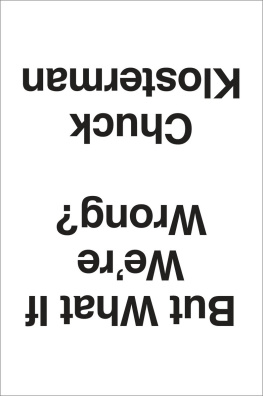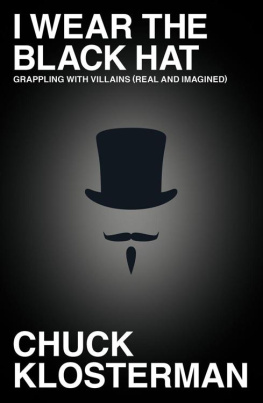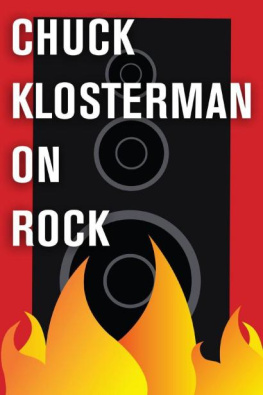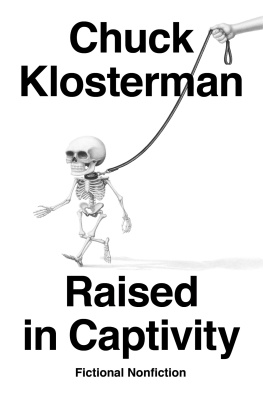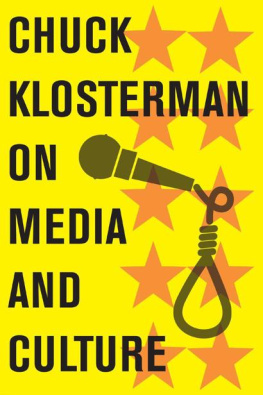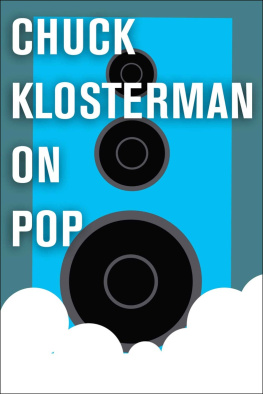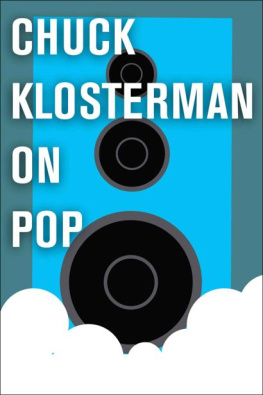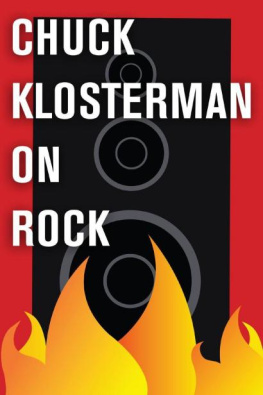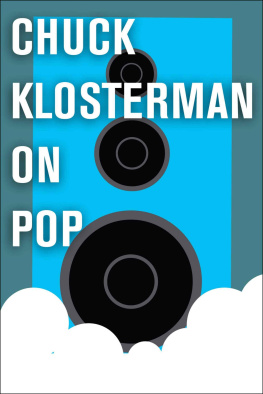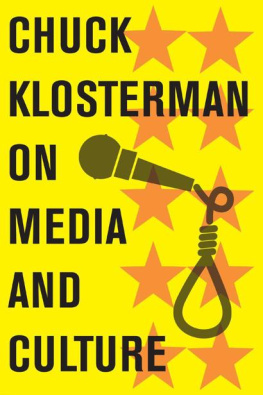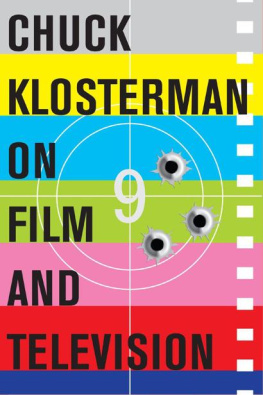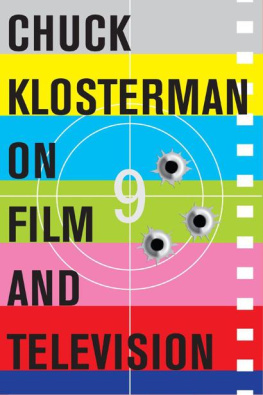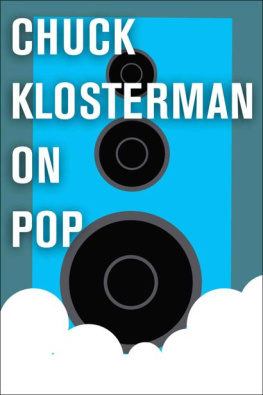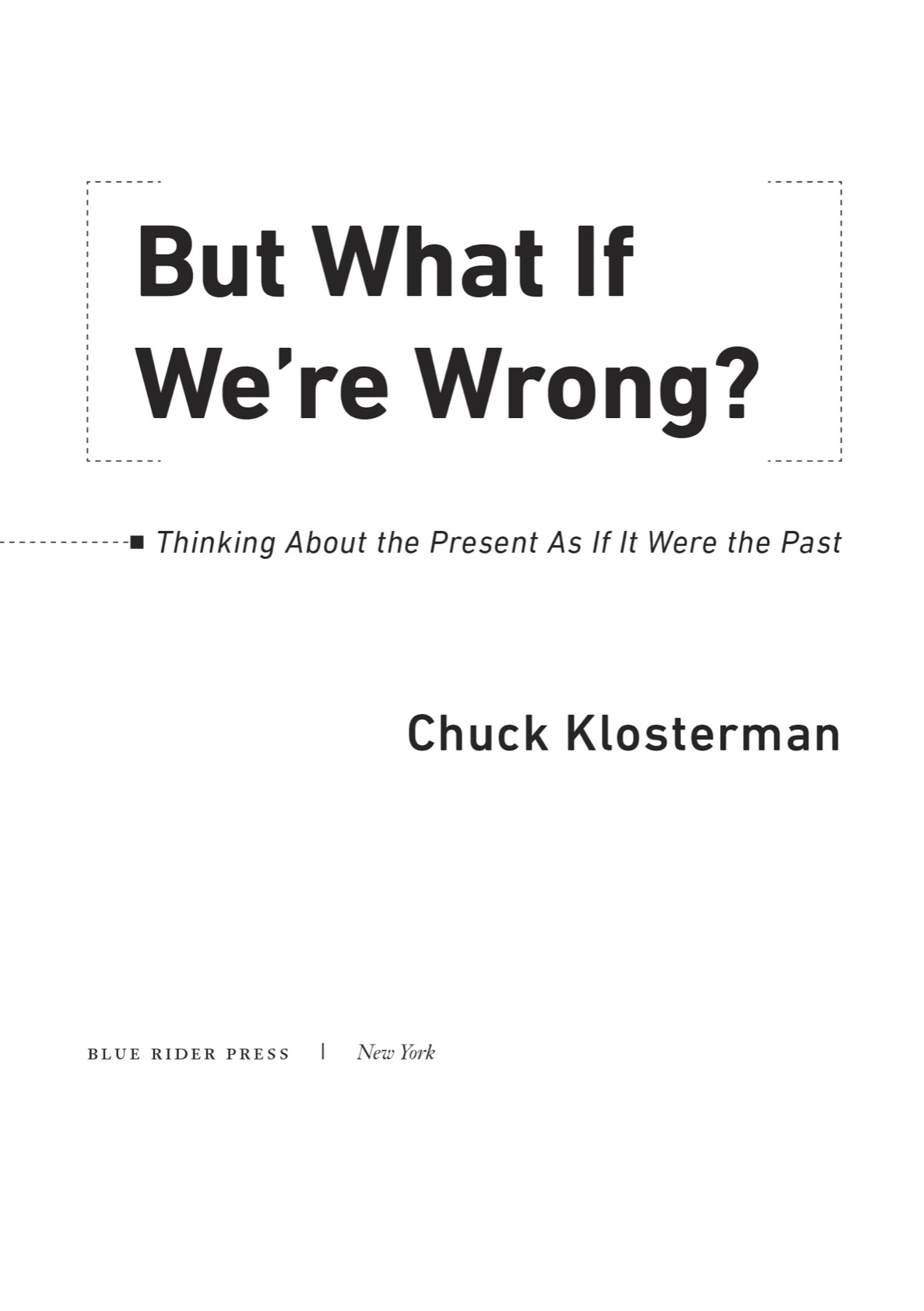Also by Chuck Klosterman
Nonfiction
Fargo Rock City: A Heavy Metal Odyssey in Rural Nrth Dakta
Sex, Drugs, and Cocoa Puffs: A Low Culture Manifesto
Killing Yourself to Live: 85% of a True Story
Chuck Klosterman IV: A Decade of Curious People and Dangerous Ideas
Eating the Dinosaur
I Wear the Black Hat: Grappling with Villains (Real and Imagined)
Fiction
Downtown Owl
The Visible Man
This is not a collection of essays.
It might look like a collection of essays, andat timesit might feel like a collection of essays. But that is not the intention.
Obviously, you can read this book however you choose. I cant demand people read this book in sequential order, nor can I stop anyone from skipping around and reading random chapters in whatever insane pattern they desire. You can read it backward, if thats your preference. But it will make more sense if you dont.
This is not a collection of essays.

An imprint of Penguin Random House LLC
375 Hudson Street
New York, New York 10014

Copyright 2016 by Chuck Klosterman
Penguin supports copyright. Copyright fuels creativity, encourages diverse voices, promotes free speech, and creates a vibrant culture. Thank you for buying an authorized edition of this book and for complying with copyright laws by not reproducing, scanning, or distributing any part of it in any form without permission. You are supporting writers and allowing Penguin to continue to publish books for every reader.
Blue Rider Press is a registered trademark and its colophon is a trademark of Penguin Random House LLC
eBook ISBN 9780399184147
Version_1
For Silas and Hope
If what I say now seems to you to be very reasonable, then Ill have failed completely.
Arthur C. Clarke, speaking in the year 1964, attempting to explain what the world might be like in the year 2000
Contents
Ive spent most of my life being wrong.
Not about everything. Just about most things.
I mean, sometimes I get stuff right. I married the right person. Ive never purchased life insurance as an investment. The first time undrafted free agent Tony Romo led a touchdown drive against the Giants on Monday Night Football, I told my roommate, I think this guy will have a decent career. At a New Years Eve party in 2008, I predicted Michael Jackson would unexpectedly die within the next twelve months, an anecdote I shall casually recount at every New Years party Ill ever attend for the rest of my life. But these are the exceptions. It is far, far easier for me to catalog the various things Ive been wrong about: My insistence that I would never own a cell phone. The time I wagered $100against $1that Barack Obama would never become president (or even receive the Democratic nomination). My three-week obsession over the looming Y2K crisis, prompting me to hide bundles of cash, bottled water, and Oreo cookies throughout my one-bedroom apartment. At this point, my wrongness doesnt even surprise me. I almost anticipate it. Whenever people tell me Im wrong about something, I might disagree with them in conversation, butin my mindI assume their accusation is justified, even when Im relatively certain theyre wrong, too.
Yet these failures are small potatoes.
These micro-moments of wrongness are personal: I assumed the answer to something was A, but the true answer was B or C or D. Reasonable parties can disagree on the unknowable, and the passage of time slowly proves one party to be slightly more reasonable than the other. The stakes are low. If Im wrong about something specific, its (usually) my own fault, and someone else is (usually, but not totally) right.
But what about the things were all wrong about?
What about ideas that are so accepted and internalized that were not even in a position to question their fallibility? These are ideas so ingrained in the collective consciousness that it seems foolhardy to even wonder if theyre potentially untrue. Sometimes these seem like questions only a child would ask, since children arent paralyzed by the pressures of consensus and common sense. Its a dissonance that creates the most unavoidable of intellectual paradoxes: When you ask smart people if they believe there are major ideas currently accepted by the culture at large that will eventually be proven false, they will say, Well, of course. There must be. That phenomenon has been experienced by every generation whos ever lived, since the dawn of human history. Yet offer those same people a laundry list of contemporary ideas that might fit that description, and theyll be tempted to reject them all.
It is impossible to examine questions we refuse to ask. These are the big potatoes.
---------
Like most people, I like to think of myself as a skeptical person. But Im pretty much in the tank for gravity. Its the force most recognized as perfunctorily central to everything we understand about everything else. If an otherwise well-executed argument contradicts the principles of gravity, the argument is inevitably altered to make sure that it does not. The fact that Im not a physicist makes my adherence to gravity especially unyielding, since I dont know anything about gravity that wasnt told to me by someone else. My confidence in gravity is absolute, and I believe this will be true until the day I die (and if someone subsequently throws my dead body out of a window, I believe my corpses rate of acceleration will be 9.8 m/s).
And Im probably wrong.
Maybe not completely, but partially. And maybe not today, but eventually.
There is a very, very good chance that our understanding of gravity will not be the same in five hundred years. In fact, thats the one arena where I would think that most of our contemporary evidence is circumstantial, and that the way we think about gravity will be very different. These are the words of Brian Greene, a theoretical physicist at Columbia University who writes books with titles like Icarus at the Edge of Time. Hes the kind of physicist famous enough to guest star on a CBS sitcom, assuming that sitcom is The Big Bang Theory. For two hundred years, Isaac Newton had gravity down. There was almost no change in our thinking until 1907. And then from 1907 to 1915, Einstein radically changes our understanding of gravity: No longer is gravity just a force, but a warping of space and time. And now we realize quantum mechanics must have an impact on how we describe gravity within very short distances. So theres all this work that really starts to pick up in the 1980s, with all these new ideas about how gravity would work in the microscopic realm. And then string theory comes along, trying to understand how gravity behaves on a small scale, and that gives us a descriptionwhich we dont know to be right or wrongthat equates to a quantum theory of gravity. Now, that requires extra dimensions of space. So the understanding of gravity starts to have radical implications for our understanding of reality. And now there are folks, inspired by these findings, who are trying to rethink gravity itself. They suspect gravity might not even be a fundamental force, but an emergent force. So I do thinkand I think many would agreethat gravity is the least stable of our ideas, and the most ripe for a major shift.

